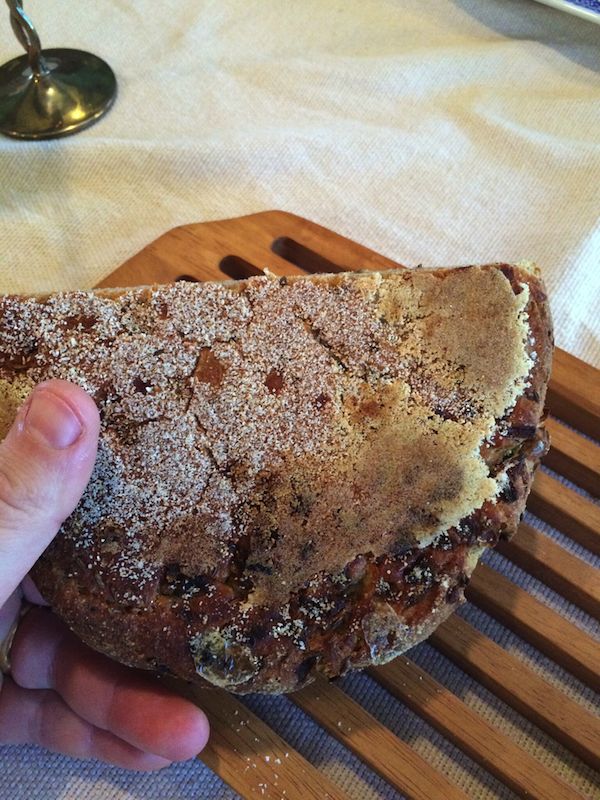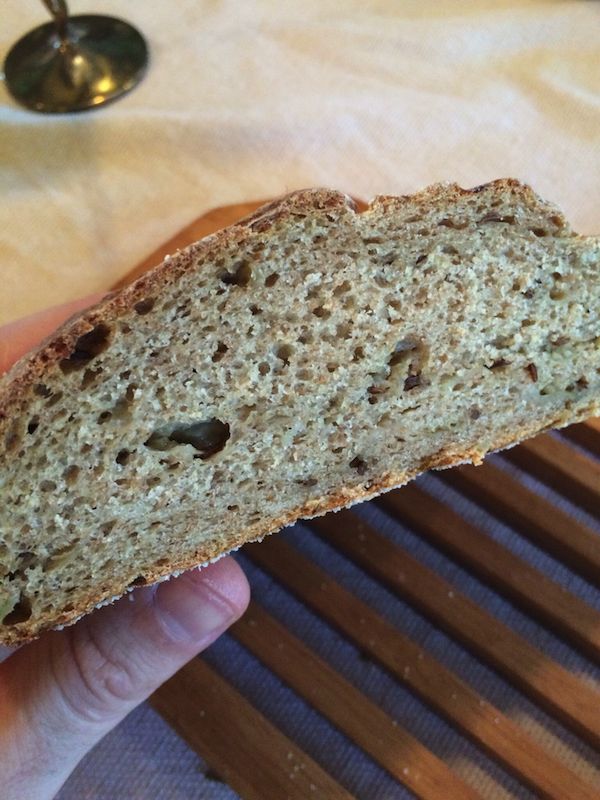
Hi folks,
I just baked my first ever bread (and first ever tarts, and some griddle cakes.. it's a baking kind of thanksgiving). I used the onion and caraway rye recipe from "Secrets of a Jewish baker". It came out pretty good for a first bread, but I'm hoping to get some tips from you on what might have caused a few issues.
I'm doing everything by hand right now, in order to learn the basics before taking the shortcuts. So no bread machine, no stand mixer, etc. I do have a brand new oven thermometer (which shows that my old Wolf oven is really not calibrated... I have to crank it 50 degrees higher than the actual temperature I want to achieve). I do measure by eye/volume, because the batteries in the scale died, so that may part of my issue here. New batteries are on order.
The flavor and the crust on this bread came out great. I baked two loaves last night, and one was gone by morning... and it's just me and the wife. So, success on that front.
However, as you can see from the photos, the bread seems a tad flatter than one might expect (or is that a rye thing?). It's a bit gummy: pressing the inside of the bread with a finger creates a film. I suspect the air holes are also not as large and the bread not as airy as it could be. From reading the forums here, it seems like one or more of the following could have happened:
- underproofed: the house was chilly, and I was not patient enough to let the bread rise properly
- underkneaded: maybe I didn't work it aggressively enough? I didn't time myself, and didn't make any dramatic slams on the work table. I've heard that rye (mixed with some all-purpose in this recipe) doesn't have as much gluten so not really sure how to judge what's supposed to happen.
- maybe I should've just baked it longer? Though the crust was just about perfect when I pulled it out.
What do you think? Is one of these more likely to be the issue than the others? Anything that jumps out at you from the photos?
Looking forward to your critiques and suggestions!


1. High hydration dough. Should be clay or putty like. Either spoon it into a loaf tin and smooth over with the back of a wet spoon or wet your hands and mould it like clay.
2. Mix, shape and straight into final proofing. When small holes start appearing on top (not too many) it is time to bake. Rye does well with longer bakes at cooler temperatures. 210C for about 50min - 1hr.
3. Don't cut into it for 24 hours otherwise it will be gummy.
My last rye bake http://www.thefreshloaf.com/node/44154/borodinsky-bread
Depending on the percentage of rye to wheat, it is not as likely to rise as much as a loaf of wheat bread. I suspect it is under cooked. In my experience I can't go by the color of the crust and I don't have much success with tapping the bottom of the crust to see if it sounds hollow. I depend on a thermometer to check the internal temperature for doneness.
My advice was for 100% rye. If this is a mix then different situation.
Thanks, Kathy! What is the internal temperature you look for in a bread like this?
I would shoot for at least 200˚F to 205˚F. Also, do not cut into the loaf until it is completely cooled.
I have answered so many requests on TFL for assistance and printed the recipes and NEVER gotten a thanks or response that anyone ever use a recipe. if you want my recipe for the perfect New York Style Jewish Caraway Onion Rye bread write me....>stubeee@aol.com<
Thanks, Stu, I will hit you up for that recipe when I am ready to try again, very interesting to compare it to the one in "Secrets".
We make a 60% whole rye 40% white wheat, like a scandinavian type. Its an entirely different animal.
Texture is different, smell is different, dough is different, everything is different.
We mix very minimally as rye doesnt do well being over worked, we fold only once because theres a lot less gluten to develop. We find that at the end of bulk it should be growing and a bit aerated but not at all the same as a wheat dough. Final proof should give small poc marks or holes breaking on the visible surface, and 85 - 95% proof is best as you wont get the oven spring that you might expect from wheat doughs.
Depending of course how much rye you use it'll all be slightly different but generally high rye content will give cracks on the finished loaf and it will be denser and less open. I cook mine to 95 - 99C internal temp.
And its true that its better the next day, though we cut ours the same day.
Hope that helps :)
Oh and, our dough is @ about 82% hydration which sounds like a lot but youd be surprides how much the meal absorbs
Thanks everyone, I'll be sure to try some of those rye approaches you suggested! I see much rye bread in my future.
Hi, novaker.
Welcome to TFL!
I started baking bread largely because I couldn't get real Jewish Sour Rye Bread where I live. I also started with Greenstein's recipes, and they are good. I will tell you they are a lot more reliable when you weigh ingredients rather than measure them. So, my first piece of advice is to replace the batteries in your scale and use it. It is you best baking friend. No question.
Of course, if you have the first edition of "Secrets of a Jewish Baker," it didn't have ingredient weights, so I redid the formula with weights. Here is a link to the formula I use now, along with detailed instructions for making the bread:
Jewish Sour Rye
The second suggestions may seem obvious, but having a healthy rye sour is really important. TheFreshLoaf has a "handbook" with a lot of useful information. I suspect few members here have really looked at it. Many probably don't know it exists. And it does have a section on working with rye flour with information you should have. Here's a link:
Rye Flour
And here is another link with information about keeping your rye sour in shape:
Care and feeding of a rye sour
You asked specifically about flat loaves. A lot of breads - most that are high-hydration and low gluten, like most good rye breads - need lateral support while proofing, or they just spread out. The support can be the sides of a basket or bowl or folds of a fabric or parchment paper couche. Now, Jewish Rye is usually only around 40% rye flour. The wheat flour does provide enough gluten to develop some real strength, and adequate mixing can help develop it and get a better shaped loaf. On the other hand, over-mixing is not a good thing either, so you need to get a feel for "just right" mixing through experience.
Anyway, I think you are off to a good start. If you want to develop your understanding of rye, I don't know a better resource than the introduction to the section on sourdough rye breads in "Bread," by Jeffrey Hamelman. Do study it.
Best of luck with your rye adventures. Keep working on it and keep asking questions and you will soon be baking the rye bread you want.
Happy baking!
David
David, thank you for the links -- lots of interesting reading in there! Just moved the dark rye flour to the fridge, had no idea it can spoil quickly. Sours seem a little intimidating.. might try to get a few "regular" breads under my belt first.